5 Wedding Guest Rules You Have to Follow—And 5 to Ignore
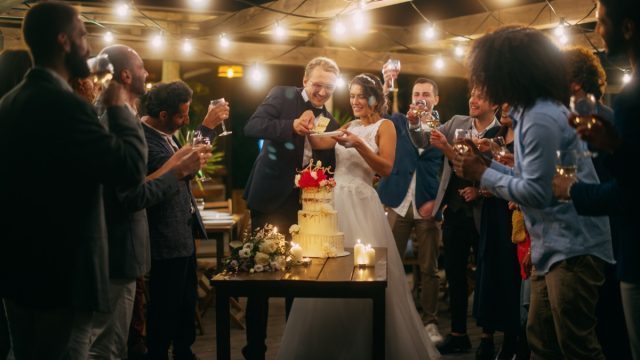
When you’re going to your first wedding, you’re usually just happy to celebrate the newlyweds. But by the time you’re a seasoned guest, you know that certain expectations also accompany these invitations. There are several aspects of traditional wedding etiquette that you still need to adhere to on a friend or family member’s big day. At the same time, there are some rules that are now a bit antiquated, etiquette experts say. With that in mind, we’ve compiled a list of the rules you need to follow and the ones you don’t. Read on to brush up on the latest wedding guest rules.
RELATED: 5 Things You Should Never Put in a Wedding Card, Etiquette Experts Say.
1
RSVP promptly and accurately.
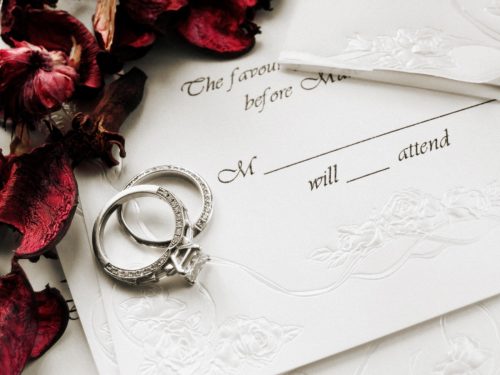
Letting the bride and groom know whether or not you’re attending the wedding is not only polite—it’s crucial for the couple to solidify their final numbers.
“RSVPing promptly is rule number one,” Kristi Spencer, etiquette expert and founder at The Polite Company, tells Best Life. “Respond as soon as you receive the invitation and know your answer helps the couple plan and sets you up to be the best guest.”
Chantelle Harman Malarkey, interior designer and hosting aesthetic expert, also stresses that you need to “stick to” your answer.
“There’s nothing worse than planning on a headcount [and then] changing the day of!” she explains. “If you are going to show up, make sure you tell them. If you can’t make it, then give advance notice!”
As part of RSVP etiquette, also take note of how your invite is addressed. If it only lists your name—without “and guest” or your significant other’s name—you shouldn’t expect to bring them along.
“It’s important to understand that not every guest receives a plus-one invitation, especially when budget considerations come into play,” Spencer says. “Respect the couple’s wishes and don’t bring a plus one or children if they were not explicitly included in the invitation. Avoid asking for exceptions or complaining about having to hire a babysitter.”
2
But you don’t have to provide an excuse if you can’t make it.

While it’s certainly an honor to take part in someone’s special day, you don’t have to attend every wedding you’re invited to. Granted, you should probably make it a point to attend the ceremonies for close friends and family members, but at the end of the day, you won’t be able to make every event—and that’s OK!
You should let the happy couple know as early as possible (preferably before the requested RSVP return date), but you don’t have to go overboard on the details.
“If you are given a paper invitation and RSVP card, you should simply fill out the lines or check the appropriate box,” Spencer says. “If you are close to the couple and would like to provide a reason that you can’t attend, it’s fine to include a short note to explain.”
RELATED: Never Say These 4 Words at a Wedding, Etiquette Expert Warns.
3
Always bring a gift.

Speaking of gifts, if you’re attending a wedding, you should bring something along for the bride and groom. According to The Knot, historically, a gift hasn’t always been mandatory, but it is considered a bit gauche to show up without one.
“Always bring a gift even if they said no gifts. A gift card to any home, grocery, or travel will do,” Cynthia Najares, planner, creative coordinator, and logistic manager at For All Time Events, says, noting that if anything, you should have a card with you to congratulate the newlyweds.
“Do not be the one to not show up with a card, at least,” she says.
4
But don’t feel like you can’t give cash or stray from the registry.
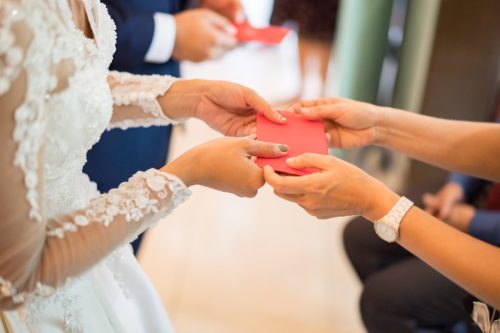
While it’s recommended that you bring something along, the rules about what you should bring are more flexible these days. According to Spencer, if you’re under the impression that you can’t give cash or a check as a gift, you’re mistaken.
“The notion of giving cash as a wedding gift has evolved over time,” Spencer says. “In today’s practical and modern world, cash can be a thoughtful and appreciated present, especially if the couple has a specific need or purpose in mind.”
If you prefer to give a physical gift, definitely consult the couple’s registry. However, Spencer says that if you’re particularly close with the bride or groom, you have more wiggle room in terms of what you give.
“You aren’t obligated to buy a gift from the registry. If you know the couple well or have received a thoughtful wedding gift yourself that you’d like to replicate, it’s perfectly fine,” she says. “Just remember to include a gift receipt, allowing the couple the option to make any necessary exchanges.”
RELATED: 8 Colors You Should Never Wear to a Wedding (And It’s Not Just White).
5
Be on time for the ceremony.
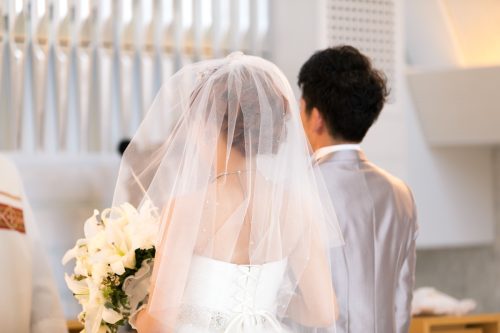
If you’re always running late, give yourself some extra time to get to a wedding. You don’t want to be the person or couple that enters the ceremony late and pulls focus from the bride and groom. Not only will you feel awkward, it likely won’t sit well with the happy couple.
“Arriving on time for the ceremony and reception demonstrates respect for the couple’s schedule and ensures a smooth flow of the event,” Steve Rader, owner of Willie Fun Events, says.
6
But enjoy more relaxed seating.
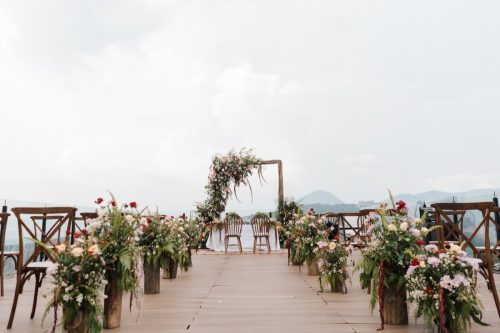
While you need to be on time, you don’t need to sit on a specific side of the aisle—for the bride and groom, respectively—unless it’s been designated ahead of time.
“Sitting on separate sides of the venue based on the bridal party was once a traditional practice, [but now] inviting guests to sit where they like is a beautiful way to symbolize the unity of the day,” Spencer says.
Malarkey notes that you can just sit in an open spot for the ceremony, but this changes a bit when it’s time for lunch or dinner. Be sure to check and see if there are seating arrangements and place cards before claiming a spot at a table.
RELATED: 6 “Polite” Things You’re Doing That Are Actually Rude, Etiquette Experts Say.
7
Celebrate the couple and “leave the drama at the door.”
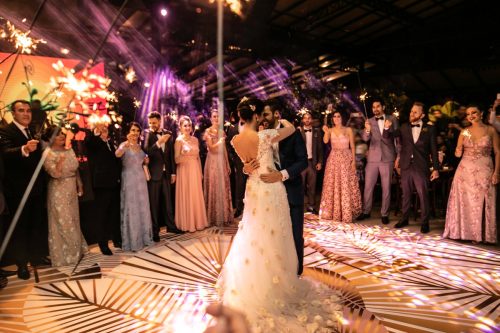
At the end of the day, weddings are supposed to be fun, so you should certainly enjoy yourself. But you should also remember that it’s someone else’s big day.
Spencer notes that you should “remember to celebrate the couple and keep them as the focus at all times.” If you don’t get along with another guest, for example, don’t use the reception as an opportunity to air your grievances.
“Weddings are a celebration of love. Leave the conflicts and drama at the door, and let the couple enjoy their special day without any unnecessary distractions,” Spencer says.
8
But don’t feel compelled to participate in everything.
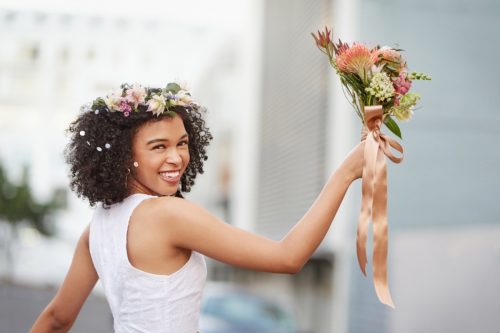
While you want to help the newlyweds have the time of their lives, you aren’t obligated to take part in every little event, including the garter or bouquet toss. These are typically for those who aren’t yet married, but even if that designation applies to you, don’t join in if you’d prefer not to.
“Participation in the garter or bouquet toss is optional. While it’s considerate to join in, it’s also acceptable to discreetly opt-out,” Spencer says. “Taking a well-timed bathroom break or stepping outside for fresh air can help you respect your preferences and enjoy the celebration.”
For more etiquette advice delivered straight to your inbox, sign up for our daily newsletter.
9
Follow the dress code—and don’t wear white.

When you think of wedding rules, the first thing that comes to mind is likely not wearing white. This still rings true for traditional weddings, which often also have a more specific dress code for guests to follow.
Malarkey notes that there are different general characterizations, including formal, cocktail, beach, and casual, so plan accordingly.
“Make sure you follow the dress code, especially if it’s a formal wedding,” she says. “You don’t want to be too over- or underdressed!”
Spencer adds that adhering to a dress code is also a matter of respect. “The couple has carefully planned every detail of their wedding, including the dress code. Honor their wishes and dress accordingly,” she says.
Unsure what to wear? The dress code is typically included with invitations, and these days, more details are spelled out on the couple’s wedding website. When in doubt, a quick Google search can clue you in.
“The couple has put in effort to create a wedding website that serves as a one-stop destination for guests,” Spencer says. “Go to their website first to find answers to your questions about the venue, parking, registry details, and any other events connected to the celebration.”
10
But recognize there are exceptions.
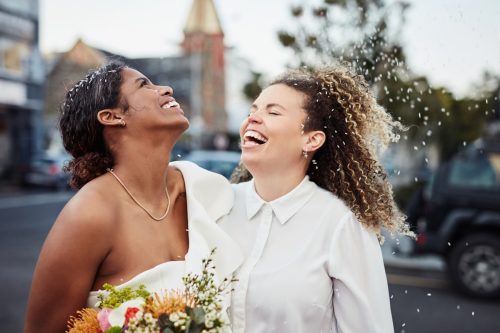
While you should follow the dress code as closely as possible, you can still incorporate your personal style, as long as it coincides with the overall atmosphere the couple is going for. In general, your outfit should never “upstage the wedding party,” Najares says.
Additionally, if the wedding you’re attending is more formal, you might be wearing heels or otherwise uncomfortable for a large part of the day. In this case, there’s no shame in tucking a pair of flats or even flip-flops for the latter part of celebrations. In fact, more comfortable footwear is something many couples now provide for their guests.
And when it comes to wearing white, it should always be avoided, unless you’re specifically instructed to wear it—which Najares says can happen!
“Wearing white or ivory is sometimes encouraged by the couple,” she says. “Before it was an old tradition to never wear these colors. Now it could be that the next wedding you go to, you’ll be [the one] in white or ivory!”